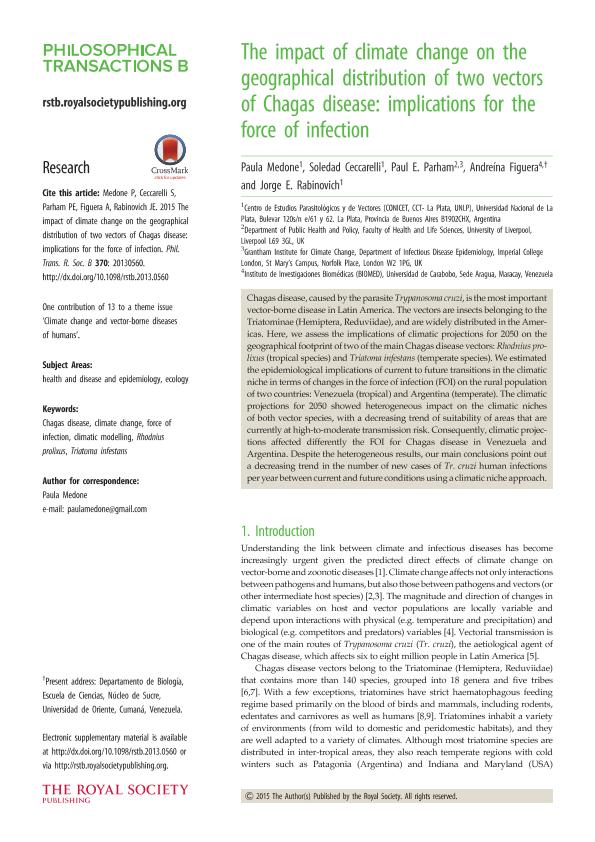Mostrar el registro sencillo del ítem
dc.contributor.author
Medone, Paula

dc.contributor.author
Ceccarelli, Soledad

dc.contributor.author
Parham, Paul E.
dc.contributor.author
Figuera, Andreína
dc.contributor.author
Rabinovich, Jorge Eduardo

dc.date.available
2017-01-02T17:30:54Z
dc.date.issued
2015-04-05
dc.identifier.citation
Medone, Paula; Ceccarelli, Soledad; Parham, Paul E.; Figuera, Andreína; Rabinovich, Jorge Eduardo; The impact of climate change on the geographical distribution of two vectors of Chagas disease: implications for the force of infection; The Royal Society; Philosophical Transactions Of The Royal Society B: Biological Sciences; 370; 1665; 5-4-2015; 1-12
dc.identifier.issn
0962-8436
dc.identifier.uri
http://hdl.handle.net/11336/10678
dc.description.abstract
Chagas disease, caused by the parasite Trypanosoma cruzi, is the most important vector-borne disease in Latin America. The vectors are insects belonging to the Triatominae (Hemiptera, Reduviidae), and are widely distributed in the Americas. Here, we assess the implications of climatic projections for 2050 on the geographical footprint of two of the main Chagas disease vectors: Rhodnius prolixus (tropical species) and Triatoma infestans (temperate species). We estimated the epidemiological implications of current to future transitions in the climatic niche in terms of changes in the force of infection (FOI) on the rural population of two countries: Venezuela (tropical) and Argentina (temperate). The climatic projections for 2050 showed heterogeneous impact on the climatic niches of both vector species, with a decreasing trend of suitability of areas that are currently at high-to-moderate transmission risk. Consequently, climatic projections affected differently the FOI for Chagas disease in Venezuela and Argentina. Despite the heterogeneous results, our main conclusions point out a decreasing trend in the number of new cases of Tr. cruzi human infections per year between current and future conditions using a climatic niche approach.
dc.format
application/pdf
dc.language.iso
eng
dc.publisher
The Royal Society

dc.rights
info:eu-repo/semantics/openAccess
dc.rights.uri
https://creativecommons.org/licenses/by-nc-sa/2.5/ar/
dc.subject
Chagas Disease
dc.subject
Climate Change
dc.subject
Force of Infection
dc.subject
Climatic Modelling
dc.subject
Rhodnius Prolixus
dc.subject
Triatoma Infestans
dc.subject.classification
Zoología, Ornitología, Entomología, Etología

dc.subject.classification
Ciencias Biológicas

dc.subject.classification
CIENCIAS NATURALES Y EXACTAS

dc.title
The impact of climate change on the geographical distribution of two vectors of Chagas disease: implications for the force of infection
dc.type
info:eu-repo/semantics/article
dc.type
info:ar-repo/semantics/artículo
dc.type
info:eu-repo/semantics/publishedVersion
dc.date.updated
2016-12-12T14:34:10Z
dc.journal.volume
370
dc.journal.number
1665
dc.journal.pagination
1-12
dc.journal.pais
Reino Unido

dc.journal.ciudad
Londres
dc.description.fil
Fil: Medone, Paula. Consejo Nacional de Investigaciones Científicas y Técnicas. Centro Científico Tecnológico la Plata. Centro de Estudios Parasitológicos y de Vectores (i); Argentina. Universidad Nacional de La Plata. Facultad de Ciencias Naturales y Museo; Argentina
dc.description.fil
Fil: Ceccarelli, Soledad. Consejo Nacional de Investigaciones Científicas y Técnicas. Centro Científico Tecnológico la Plata. Centro de Estudios Parasitológicos y de Vectores (i); Argentina. Universidad Nacional de La Plata. Facultad de Ciencias Naturales y Museo; Argentina
dc.description.fil
Fil: Parham, Paul E.. University Of Liverpool; Reino Unido. Imperial College London; Reino Unido
dc.description.fil
Fil: Figuera, Andreína. Universidad de Carabobo. Instituto de Investigaciones Biomédicas; Venezuela
dc.description.fil
Fil: Rabinovich, Jorge Eduardo. Consejo Nacional de Investigaciones Científicas y Técnicas. Centro Científico Tecnológico la Plata. Centro de Estudios Parasitológicos y de Vectores (i); Argentina. Universidad Nacional de La Plata. Facultad de Ciencias Naturales y Museo; Argentina
dc.journal.title
Philosophical Transactions Of The Royal Society B: Biological Sciences

dc.relation.alternativeid
info:eu-repo/semantics/altIdentifier/doi/http://dx.doi.org/10.1098/rstb.2013.0560
dc.relation.alternativeid
info:eu-repo/semantics/altIdentifier/url/http://rstb.royalsocietypublishing.org/content/370/1665/20130560
dc.relation.alternativeid
info:eu-repo/semantics/altIdentifier/url/https://www.ncbi.nlm.nih.gov/pmc/articles/pmid/25688019/
Archivos asociados
